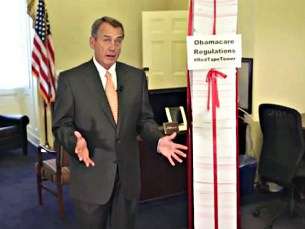The GOP's Two Approaches to Fighting Obamacare

Right now, Republicans in Congress are united in their distaste for Obamacare. There's no Republican who doesn't want to fight it, somehow. But when it comes to opposing the law, there are two very different strategies at work.
The first approach is focused on maintaining adamant, outspoken opposition to the law, and pushing for full repeal, as soon as possible, and little else. This is the approach that you've likely heard the most about. It's fiery and ferocious, powered by the deep and ongoing conservative activist opposition to Obamacare. It's emphasis is on pushing back against the law, the whole law, as often and as boldly as possible.
The camp that favors this approach generally tends to be skeptical of GOP-led efforts to tweak the law, especially if those tweaks might have the effect of making the law function a little more smoothly, or make it a little easier for the White House to downplay its problems. They don't necessarily demand that all anti-Obamacare votes be full-repeal votes, but they certainly don't mind voting for full repeal on a regular basis. Mostly, they want to see actions clearly and unambiguously intended to defund and dismantle the law, all at once if possible, chunk by chunk if necessary, rather than rework it.
The second approach, favored by at least some in House leadership, is a little more subtle. It's not opposed to repealing the law, but it believes there are limits to the battering ram approach. It understands that full repeal votes, while not strictly useless, are primarily symbolic—messaging tools more than meaningful legislative vehicles. Most of all, it understands, and takes as its starting point, the notion that with a Democrat in the White House, and Democrats controlling the Senate, the chances of a full-repeal bill becoming law are nonexistent. Democrats simply wouldn't cooperate.
That's why this approach is focused on highlighting Obamacare's legislative flaws and its negative impacts on families and businesses, on pushing and prodding at its various weak points in order to show the many ways that it won't work as promised as planned. This strategy focuses most on fraud and dysfunction, on practical pocketbook issues and bureaucratic complications for workers and employers. For this group, full repeal is a distant goal. But delay is in sight. The goal, for now, is to convince enough voters, and, in turn, enough congressional Democrats, that it's in their interests to put off the start of the law by a year.
No one thinks that will be easy. And everyone knows there's not a lot of time. Much of the public discussion about the start of Obamacare is focused on October 1, when the exchanges open and start enrolling individuals in subsidized insurance plans. But some congressional Republicans are focused on another date—January 1, when the coverage and the accompanying subsidies both go into effect. At that point, efforts to delay or cancel the law will become significantly more difficult.
Convincing Democrats to go along with a delay before then will be hard. But it might not be impossible. For one thing, it's not necessary to reach every Democrat in Congress. It may not even be necessary to convince a majority of them. And the way to reach Democrats in Congress (and, to a lesser extent, the White House) is through the public—and in particular through moderate Democrats.
Polls have always shown that the broader public is wary of the law. But what we've seen recently is that support has fallen dramatically amongst the president's own party. In February, the Kaiser Health Tracking Poll reported that support for the law amongst Democrats had fallen from 72 percent in November 2012 to 57 percent just three months later. Today, The Washington Post reported on a new poll showing that support has fallen to just 46 percent amongst ideologically moderate Democrats, down by 11 points in the last year. Those sorts of numbers, along with the law's ongoing unpopularity, help explain why a splinter group of House Democrats voted with Republicans to delay the law's employer and individual mandates—defying the White House in the process.
Ultimately the challenge will be to ensure that the two strategies work together. But so far, I'd argue, they largely have. The repeal votes have helped keep pressure on the law, fueling the opposition for the years. Votes like the mandate-delay bills we saw last week, meanwhile, are revealing cracks in support for Obamacare, or at least parts of it, amongst congressional Democrats. Meanwhile, support amongst self-identified Democrats in the electorate is falling. None of this is good news for the law. And while it doesn't make repeal or delay particularly likely in any realistic assessment, it does suggest that, at least to some extent, both strategies are making an impact.


Show Comments (79)